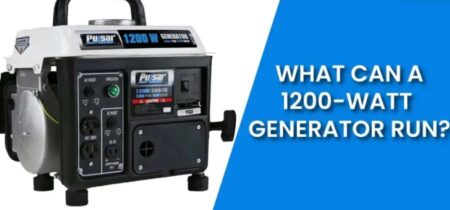
An inverter generator makes use of cutting-edge technology. They create direct current (DC) and then use an inverter to convert it to alternating current (AC), in contrast to conventional generators that produce AC directly. As a result, the power output is much more stable and reliable. This is needed for sensitive electrical devices like computers, cell phones, and TVs. Inverter generators frequently have smaller, lighter frames than your conventional generator, making them simpler to move from place to place. They use less fuel, which will ultimately cost you less money. Inverter generators are a favorite option for residential settings and outdoor activities like camping and tailgating because they are additionally quieter than conventional generators.
Pros and Cons of Inverter Generators
Pros of Inverter Generators
Less fuel used:
Inverter generators are known for their high fuel economy. They’re able to automatically change the engine speed in response to changes in power demand, which accounts for this. This indicates that the generator only consumes the amount of fuel required to generate the desired amount of power. As a result, inverter generators often use less fuel than conventional generators, which operate at a fixed speed regardless of the demand for power.
Portability:
Inverter generators tend to be smaller and more lightweight than standard generators. If you’re going camping or need to transfer it to a different area of your home, this makes them much simpler to travel to different areas. The addition of handles or wheels makes many inverter generators even more portable.
Clean Power:
The electricity generated by inverter generators is less likely to harm delicate electronic equipment, such as laptops and smartphones. This is so that the electrical signal can be smoothed down by the inverter technology, which leads to a more steady power production with fewer fluctuations.
Cons of Inverter Generators
Cost:
Compared to conventional generators, inverter generators are typically more expensive. This is because they generate clean, reliable power using cutting-edge technology. But, if you need to power delicate electronic equipment or need a more fuel-efficient generator, this expense can be worthwhile.
Limited Power Output:
Inverter generators are often made for applications requiring reduced power output. They can be utilized for bigger power requirements, although they might not be the most economical or efficient choice. You might be better off using a conventional generator if you need to power heavy equipment or run electrical appliances.
Maintenance:
For maximum lifetime, inverter generators require routine maintenance. The oil should be changed, the air filter should be cleaned or replaced, and the spark plug should be examined. All generators have this characteristic, however, it’s crucial to remember that inverter generators have more advanced technology than conventional generators, which could lead to more frequent maintenance requirements.
What is an Inverter Generator Used For?
As they are so adaptable, inverter generators are perfect for a variety of uses. Listed below are just a handful of the inverter generators’ most typical applications
1. Camping and Outdoor activities
For outdoor activities like camping and hiking, inverter generators are perfect. They’re simple to move and use in far-off places due to their size, lightweight feature, and silence. Everything from fans and camping lights to tiny equipment like coffee makers and portable refrigerators can be powered by inverter generators.
2. Emergency Backup Power
When there seem to be power issues or load-shedding, inverter generators are a great option for backup power. They are perfect for use in residential areas because they don’t make any noise and consume less fuel than conventional generators. During a prolonged power outage, inverter generators can power necessary items like refrigerators, freezers, and sump pumps to keep you secure. When there is no power, inverter generators are a great option for backup power. They are perfect for use in residential settings because they are much quieter and consume less fuel than conventional generators. During a prolonged power outage, inverter generators can power necessary items like refrigerators, freezers, and sump pumps to keep you secure and comfortable.
3. Construction sites
On building sites, inverter generators are also important. They are perfect for usage in distant settings or places where power is not easily accessible since they can power tools and equipment without the requirement for a stable power source. In addition to being quieter than conventional generators, inverter generators are more suited for usage in residential areas or other places where there are noise limitations.
4. Outdoor events
Outdoor events like concerts, festivals, and sports competitions can also run and power on inverter generators. They have the ability to power everything from floodlights and sound systems to food trucks and other vendors. In places where noise and air pollution are a major concern, inverter generators are the best choice since they are quieter and use less fuel than conventional generators.
5. RVs and boats
Boats and RVs can both benefit from using inverter generators. They are portable and lightweight, making it simple to store and move them. On lengthy trips, inverter generators are necessary since they can power anything from air conditioners and freezers to TVs and sound systems.
Can I Power My House with an Inverter Generator?
Inverter generators are excellent for powering portable electronics and appliances, but they might not have the capability to power a complete house. You might need to spend money on a larger, conventional generator if you want to keep your house powered during a power outage. But, an inverter generator might be adequate if you only need to run a few essential appliances, such as your refrigerator, TV, and lights.
How Long Do Inverter Generators Last?
The lifespan of an inverter generator is a crucial consideration when buying one. What is the lifespan of inverter generators? An inverter generator’s lifespan is influenced by a number of things, including its quality, usage, maintenance, and storage. With the right maintenance and care, a high-quality inverter generator may often last 10,000 to 20,000 hours or more. To increase an inverter generator’s longevity, regular maintenance is essential. Maintenance entails maintaining the generator’s cleanliness and dryness, replacing the oil and air filter, and testing the spark plug. The generator should only be used up to its recommended load capacity; overloading the generator might harm the engine and reduce its lifespan. An inverter generator must be stored properly to prolong its longevity.
The generator needs to be protected from the elements and kept in a cool, dry location when not in use. To avoid stale fuel or fuel that could harm the carburetor, it’s also crucial to drain the fuel and store the generator in an empty tank. The lifespan of an inverter generator can also be influenced by its brand and model. In general, more expensive brands and models are made of tougher materials and are intended to last longer. It’s critical to conduct research and make an investment in a high-quality, long-lasting inverter generator. In conclusion, a variety of factors, such as quality, usage, maintenance, and storage, might affect an inverter generator’s longevity. A high-quality inverter generator may operate for 10,000 to 20,000 hours or more with the right upkeep and care. To ensure a quality inverter generator lasts as long as possible, it’s crucial to make an investment in one and to maintain it properly.
How Do You Tell If a Generator Is an Inverter?
1. Check the Weight
Compared to standard generators, inverter generators are often much lighter. This is so that they can generate power more efficiently than conventional generators, which rely on bulky alternators and other mechanical parts. It’s probably an inverter generator if the generator is quite light.
2. Look For a DC Output
Traditional generators do not typically have a DC output, however, inverter generators do. Batteries and other devices that require DC power are powered by the DC output. The generator is probably an inverter generator if it has a DC output.
3. Check the Noise Level
Compared to conventional generators, inverter generators are substantially quieter. This is due to the fact that they generate power using sophisticated electronics as opposed to traditional generators, which employ noisy mechanical components. An inverter generator is most likely present if the generator is quite quiet.
4. Look for a Pure Sine Wave Output
Unlike the output provided by conventional generators, which is dirtier and less stable, inverter generators create a perfect sine wave. Powering delicate electronic gadgets like computers, smartphones, and televisions requires a pure sine wave output. It is probably an inverter generator if the output is a clean sine wave.
5. Check the price
Generally speaking, inverter generators cost more than conventional generators. This is so that they can generate power more efficiently than conventional generators, which rely on mechanical parts that are less expensive to make. An inverter generator is most likely present if the generator is relatively pricey.
What is an Inverter Generator Conclusion
Popular and adaptable generators that may be used for a range of purposes are inverter generators. They are a wonderful option for powering delicate devices and outdoor activities due to their reliable power output, mobility, and fuel efficiency. They may not be adequate for bigger power requirements, though, and they need constant upkeep. If you’re looking to buy a generator.
Also Read:








